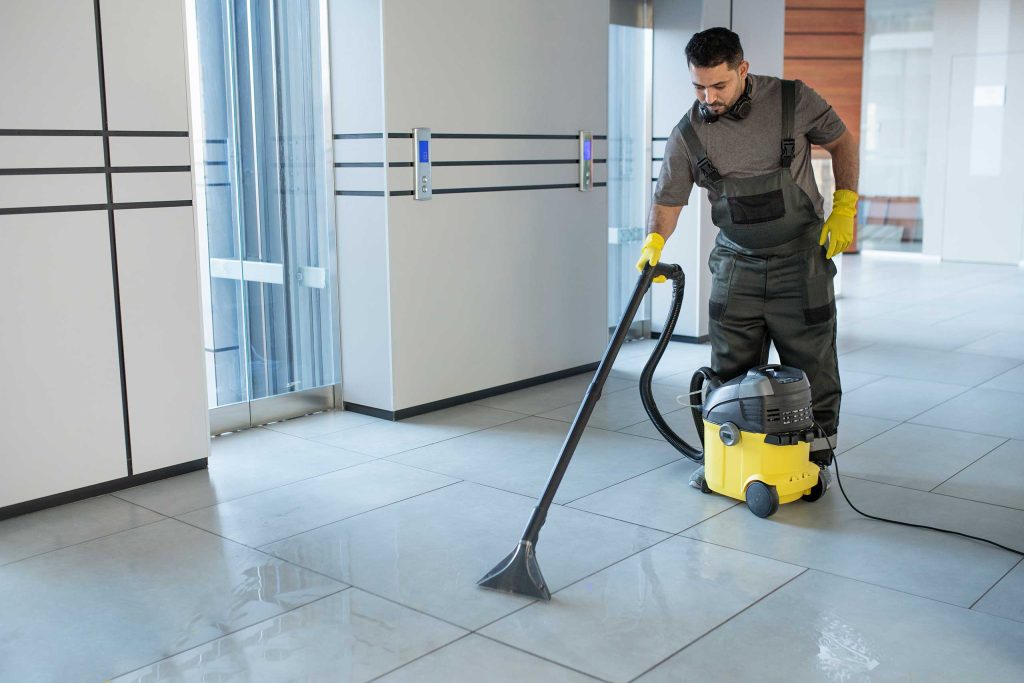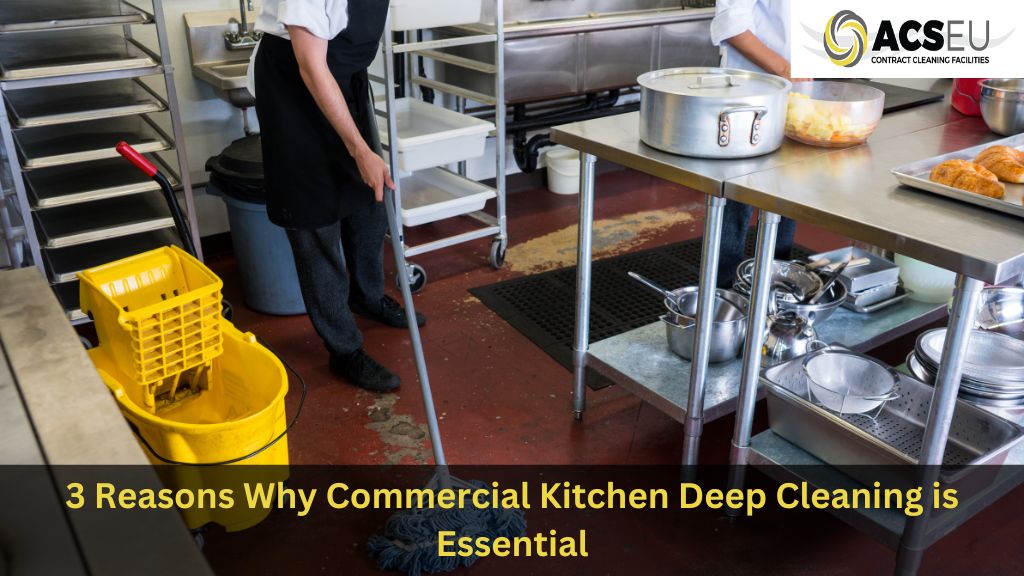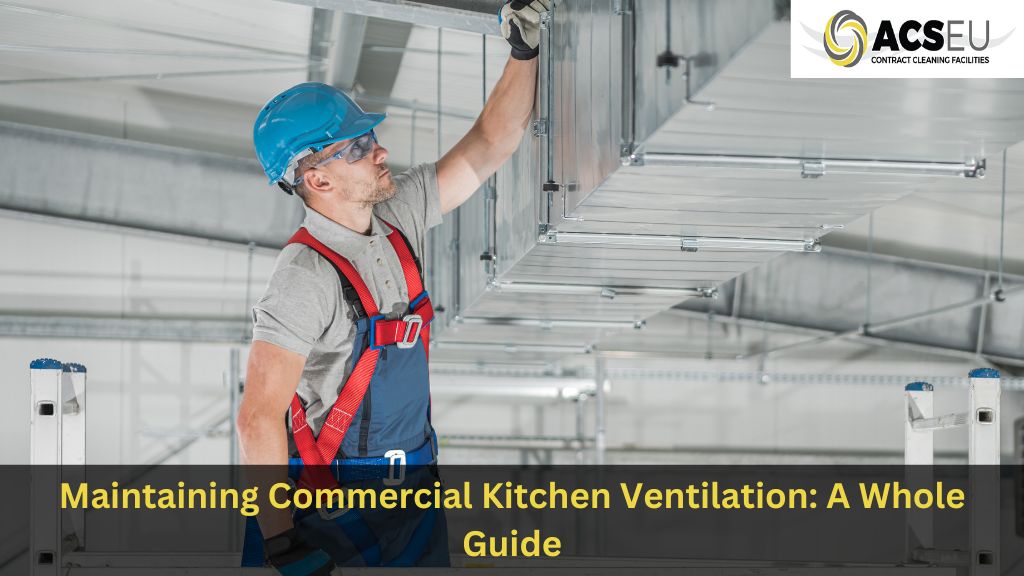A kitchen, especially in a commercial setting, is the heart of operations, but it’s also a battlefield. Daily use surfaces endure exposure to heat, grease, food residues, steam, and constant foot traffic. Over time, layers of grime, grease, and microbial buildup accumulate in corners, ductwork, hoods, floor drains, and equipment that are rarely or poorly cleaned. By ignoring kitchen deep cleaning, what starts as a cosmetic issue can quickly escalate into serious risks.
In this article, we’ll explore the consequences of ignoring kitchen deep cleaning for too long, why investing in kitchen deep cleaning services is crucial, and how ACSEU’s expertise can help protect your business, staff and reputation.
Why “deep cleaning” is more than a scrub
First, we need to clarify that kitchen deep cleaning goes far beyond day-to-day wiping or mopping. It means reaching under, behind, inside, above and within tackling grease-laden ducts, extraction hoods, filters, wall/ceiling surfaces, ovens, fryers, drains, and hidden nooks. This is what professional commercial kitchen deep cleaning services offer, especially when aligned with industry guidelines (e.g. TR19 for ventilation hygiene in the UK).
Many businesses rely only on surface cleaning, hoping that “out of sight = out of problem.” But those unseen places are where trouble often starts.
The cascading consequences of neglect
Here are the significant risks of delaying or ignoring proper kitchen deep cleaning:
1. Fire hazards and risk of damage
Grease is highly flammable. As cooking fumes travel through hoods and ducts, grease-laden particles condense on cooler surfaces. Over months or years, a thick layer of carbon grease can form, ready to ignite. In fact, one of the leading causes of fires in commercial kitchens is accumulated grease in ventilation systems.
A small spark or overheated hood can lead to disastrous damage, loss of equipment, structural repairs, downtime, and possibly invalidated insurance claims.
2. Health, hygiene and food safety risks
Bacteria, mould, and pathogens thrive in dark, damp, and greasy crevices. Foods touched by contaminated utensils, surfaces or air can become vehicles for foodborne illnesses such as Salmonella, E. coli, Listeria and others.
Regulators and Environmental Health Officers (EHOs) conduct inspections unannounced. If they detect unhygienic conditions, clogged grease, poor cleaning records or pest signs, they can impose fines, serve prohibition notices, or even close down premises until issues are resolved.
3. Pest infestations
Leftover food particles, grease, spillage, crumbs, and hidden residues attract pests, rodents, cockroaches, flies, and ants. Once pests infiltrate, they can spread contamination, damage packaging, gnaw wiring, and amplify health risks. A kitchen that smells or shows pest activity quickly loses reputation and breaches hygiene rules. (NOVA Commercial Hood Cleaning)
4. Equipment degradation, inefficiency and unplanned breakdowns
Grease and grime can hinder heat transfer, block vents, choke filters and fans, and increase the load on motors, compressors, ovens, refrigerators, and HVAC systems. Over time, this accelerates wear, reduces efficiency and shortens equipment lifespan.
An under-maintained hood fan could fail or run inefficiently during peak hours, leading to outages, unhappy customers, and expensive emergency repair calls.
Additionally, the longer you wait, the harder the cleaning becomes: what might have been a 2-hour deep clean becomes a multi-shift, multi-crew operation.
5. Odour, aesthetics, and staff morale
Lingering kitchen odours from grease, stale air, clogged drains or spills saturate surfaces. That smell pervades not only during service hours but can seep into dining areas, damaging the customer experience.
A grimy kitchen is demoralising for staff. Working in a sticky, smoky, odorous environment lowers morale, productivity and contributes to staff turnover.
6. Regulatory, legal and financial exposure
Beyond fines and shutdowns, negligence can expose you to legal liability if a customer becomes ill or if damage spreads beyond your premises (e.g., fire, smoke damage).
Insurance policies often require documented proof of regular maintenance, including commercial kitchen cleaning and ventilation/hygiene work. If claims arise and you lack evidence, insurers may refuse coverage.
Furthermore, a poor food hygiene rating (often publicly displayed) can deter potential customers and prompt negative reviews. Restaurants with top ratings tend to attract significantly more business than those with mediocre scores.
Ignoring Kitchen Deep Cleaning: Signs that your kitchen’s deep cleaning is overdue
- Significant grease or carbon build-up in hoods, filters or duct interiors
- Smoke, heat, or odours lingering in the kitchen
- Frequent equipment overheating, inefficiency, or “stuck” parts
- Complaints of pests or signs of droppings, gnawed surfaces
- Failures or warnings from hygiene or fire inspections
- Aged cleaning records or no documented deep cleans in months
As guidelines suggest, many commercial kitchens benefit from a kitchen deep cleaning at least every six months (or more often for high-volume kitchens).
Why relying on professional cleaners matters
You could attempt to deep-clean in-house, but the scale, tools, risk and technical requirements make it a challenge. That’s where commercial kitchen deep cleaning services, commercial kitchen cleaners, or a dedicated commercial kitchen cleaning company add value.
Such specialists bring:
- Expertise in TR19, HACCP, fire and hygiene regulations
- Advanced tools: pressure steam, degreasers, and extraction flushing
- Access to hard-to-reach areas (ducts, fans, interiors)
- Detailed inspections, before/after photos, compliance reports
- Scheduling flexibility (overnight or off-peak) to avoid disruption
As ACSEU explains in its service offering, professional deep cleaners ensure no hidden pockets remain untreated, helping prolong equipment life, reduce fire risk, and maintain regulatory compliance.
How ACSEU’s Kitchen Deep Cleaning Service helps
At ACSEU, we specialise in providing a full kitchen deep cleaning service tailored to commercial kitchens across the UK. Our process:
- Site assessment & scheduling: We assess your kitchen, understand usage patterns, and plan a deep clean that fits your operations.
- Comprehensive cleaning: From extraction, hoods, ducts, filters, walls, ceilings, appliances, drains, and beyond, we tackle every corner.
- Use of industry-standard methods: High-pressure steam, degreasers, safe chemical protocols, and advanced tools deliver deep sanitation.
- Compliance documentation: We provide certification, photographic evidence and reports to support inspections, insurers, and audits.
- Follow-up cycles: We help plan scheduled deep cleans (e.g. 3- to 6-monthly) and coordinate with your team to maintain hygiene standards.
By partnering with ACSEU, clients avoid the pitfalls of neglect, safeguard their business and comply with both hygiene and fire safety obligations.
Summary: Consequences of Ignoring Kitchen Deep Cleaning
Ignoring kitchen deep cleaning for too long may seem like a cost-saving measure, but the risks far outweigh the savings. From increased fire hazard to health violations, equipment breakdowns, pest infestations, and damage to your brand, the consequences are severe.
Investing in regular, professional kitchen deep cleaning services isn’t just about cleanliness; it’s about protecting your people, your assets, your compliance, and your reputation.
If you’d like to learn how ACSEU can support your commercial kitchen with expert deep cleaning, get in touch or request a quote. Don’t wait until things spiral; act now and keep your kitchen in top condition.

 Unit Q, Dodd Lane, Dodd Lane Industrial Estate, Chorley Rd, Westhoughton, BL5 3NA
Unit Q, Dodd Lane, Dodd Lane Industrial Estate, Chorley Rd, Westhoughton, BL5 3NA 




